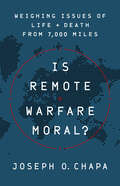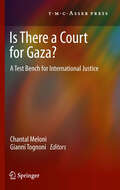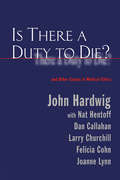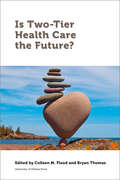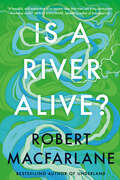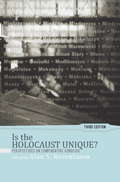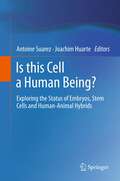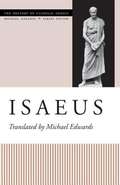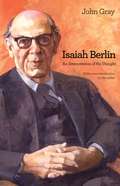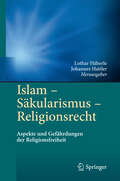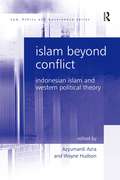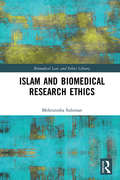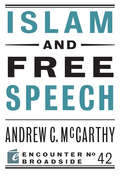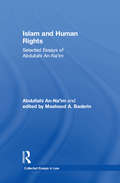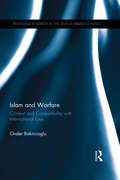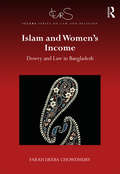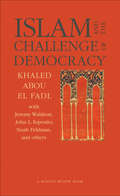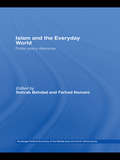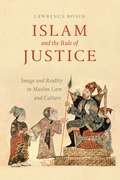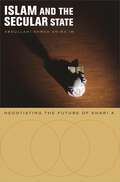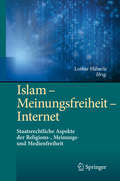- Table View
- List View
Is Killing People Right?
by Allan C. Hutchinson'Great cases' are those judicial decisions around which the common law pivots. In a sequel to the instant classic Is Eating People Wrong?, this book presents eight new great cases from the United Kingdom, the United States and Australia. Written in a highly accessible yet rigorous style, it explores the social circumstances, institutions (lawyers, judges and courts) and ordinary people whose stories shaped the law. Across the courts' diverse and uncoordinated attempts to adapt to changing conditions and shifting demands, it shows the law as the living, breathing and down-the-street experience it really is. Including seminal cases in end of life, abortion and equal rights, this is an ideal introduction for students to legal history and jurisprudence.
Is Remote Warfare Moral?: Weighing Issues of Life and Death from 7,000 Miles
by Joseph O ChapaAmerica is at an important turning point. Remote warfare is not just a mainstay of post–9/11 wars, it is a harbinger of what lies ahead—a future of high-tech, artificial intelligence–enabled, and autonomous weapons systems that raise a host of new ethical questions. Most fundamentally, is remote warfare moral? And if so, why? Joseph O. Chapa, with unique credentials as Air Force officer, Predator pilot, and doctorate in moral philosophy, serves as our guide to understanding this future, able to engage in both the language of military operations and the language of moral philosophy. Through gripping accounts of remote pilots making life-and-death decisions and analysis of high-profile cases such as the killing of Iranian high government official General Qasem Soleimani, Chapa examines remote warfare within the context of the just war tradition, virtue, moral psychology, and moral responsibility. He develops the principles we should use to evaluate its morality, especially as pilots apply human judgment in morally complex combat situations. Moving on to the bigger picture, he examines how the morality of human decisions in remote war is situated within the broader moral context of US foreign policy and the future of warfare.
Is There a Court for Gaza?
by Chantal Meloni Gianni TognoniThe 'Goldstone Report' of September 2009 started a critical debate at the international level. The Report raised serious allegations of grave violations of international law with regard to the Israeli attack on Gaza of 27 December 2008 - 18 January 2009, amounting to possible war crimes and crimes against humanity. The UN General Assembly and the Human Rights Council, amidst high political pressure, endorsed the Report's recommendations, calling for prompt and proper investigations to ensure accountability and justice for the victims. Given the lack of proper investigations at the national level, international justice mechanisms are now needed. Indeed, the ICC opened a preliminary examination of the situation but difficulties arose because of the uncertain status of the occupied Palestinian territory. The issue of the existence of a State of Palestine is extremely actual and still unsolved at the UN level. With a foreword by prof. William Schabas, the book collects contributions by renowned international law professors as Eric David, John Dugard, Richard Falk and many other distinguished scholars and lawyers, and brings together for the first time essential documentation on the 'Gaza conflict'. The underlying question, whether there is a court for Gaza, can be seen as a test case for international justice, and shed a light on the role of international institutions in the difficult combination of law and politics that connotes international justice. Useful for all those interested in the Israeli-Palestinian conflict, such as international and criminal law scholars, and human rights and humanitarian organizations.
Is There a Duty to Die?: And Other Essays in Bioethics (Reflective Bioethics)
by John HardwigFirst published in 2000. Routledge is an imprint of Taylor & Francis, an informa company.
Is Two-Tier Health Care the Future? (Law, Technology and Media)
by Stephen Duckett Gregory P. Marchildon Achim Schmid Fiona McDonald Stephen Thomas Bridget Johnston Sara Allin Sarah Barry Sara Burke Danielle Dawson Lorraine Frisina Doetter Noushon Farmanara Vanessa Gruben Jeremiah Hurley Martha Jackman Rachel McKay Jonathan Mullen Zeynep Or Aurélie Pierre Amélie Quesnel-Vallée David Rudoler Rikke Siersbaek Carolyn Hughes TuohyCanadians are deeply worried about wait times for health care. Entrepreneurial doctors and private clinics are bringing Charter challenges to existing laws restrictive of a two-tier system. They argue that Canada is an outlier among developed countries in limiting options to jump the queue. This book explores whether a two-tier model is a solution. In Is Two-Tier Health Care the Future?, leading researchers explore the public and private mix in Canada, Australia, Germany, France, and Ireland. They explain the history and complexity of interactions between public and private funding of health care and the many regulations and policies found in different countries used to both inhibit and sometimes to encourage two-tier care, such as tax breaks. This edited collection provides critical evidence on the different approaches to regulating two-tier care across different countries and what could work in Canada. This book is published in English.
Is a River Alive?
by Robert MacfarlaneFrom the celebrated writer, observer and naturalist Robert Macfarlane comes a brilliant, perspective-shifting new book, which answers a resounding "yes" to the question of its title.At the heart of Is a River Alive? is a single, transformative idea: that rivers are not mere matter for human use, but living beings, who should be recognized as such in both imagination and law. Macfarlane takes the reader on a mind-expanding global journey into the history, futures, people and places of the ancient, urgent concept.Around the world, rivers are dying from pollution, drought and damming. But a powerful movement is also underway to recognize the lives and the rights of rivers, and to re-animate our relationships with these vast, mysterious presences whose landscapes we share. The young "rights of nature" movement has lit up activists, artists, law-makers and politicians across six continents—and become the focus for revolutionary thinking about rivers in particular.The book flows like water, from the mountains to the sea, over three major journeys. The first is to northern Ecuador, where a miraculous cloud-forest and its rivers are threatened with destruction by Canadian gold-mining. The second is to the wounded rivers, creeks and lagoons of southern India, where a desperate battle to save the lives of these waterbodies is underway. The third is to northeastern Quebec, where a spectacular wild river—the Mutehekau or Magpie—is being defended from death by damming in a river-rights campaign led by an extraordinary Innu poet and leader called Rita Mestokosho.Is A River Alive? is at once a literary work of art, a rallying cry and a catalyst for change. It is a book that will open hearts, spark debates and challenge perspectives. A clarion call to re-centre rivers in our stories, law and politics, it invites us to radically re-imagine not only rivers but life itself. At the heart of this vital, beautiful book is the recognition that our fate flows with that of rivers—and always has.
Is the Death Penalty Dying?
by Austin Sarat Jürgen MartschukatThis volume of "Studies in Law, Politics, and Society" presents a unique special issue "Is the Death Penalty Dying'. " Drawing together an array of distinguished scholars from political science, criminology, sociology, and law, this volume provides a compr
Is the Holocaust Unique?
by Alan S RosenbaumIn essays written specifically for this volume, distinguished contributors assess highly charged and fundamental questions about the Holocaust: Is it unique? How can it be compared with other instances of genocide? What constitutes genocide, and how should the international community respond? On one side of the dispute are those who fear that if the Holocaust is seen as the worst case of genocide ever, its character will diminish the sufferings of other persecuted groups. On the other side are those who argue that unless the Holocaust's uniqueness is established, the inevitable tendency will be to diminish its abiding significance. The editor's introductions provide the contextual considerations for understanding this multidimensional dispute and suggest that there are universal lessons to be learned from studying the Holocaust. The third edition brings this volume up to date and includes new readings on the Cambodian and Rwandan genocides, common themes in genocide ideologies, and Iran's reaction to the Holocaust. In a world where genocide persists and the global community continues to struggle with the implications of international crime, prosecution, justice, atonement, reparation, and healing, the issues addressed in this book are as relevant as ever.
Is this Cell a Human Being?
by Antoine Suarez Joachim HuarteThe central question of this book is whether or not particular cell entities of human origin ought to be considered human beings. The answer is crucial for making moral decisions for or against research and experimentation. Experts in the field discuss the production of embryonic-like pluripotent stem cells by altered nuclear transfer, parthenogenesis and reprogramming of adult somatic cells. They thoroughly analyse the biological and moral status of different cell entities, such as human stem cells, embryos and human-animal hybrid embryos, and make a decisive step towards establishing final criteria for what constitutes a human being. The topic is challenging in nature and of broad interest to all those concerned with current bioethical thought on embryonic human life and its implications for society.
Isaeus
by Michael EdwardsThis is the eleventh volume in the Oratory of Classical Greece. This series presents all of the surviving speeches from the late fifth and fourth centuries BC in new translations prepared by classical scholars who are at the forefront of the discipline. These translations are especially designed for the needs and interests of today's undergraduates, Greekless scholars in other disciplines, and the general public. Classical oratory is an invaluable resource for the study of ancient Greek life and culture. The speeches offer evidence on Greek moral views, social and economic conditions, political and social ideology, law and legal procedure, and other aspects of Athenian culture that have recently been attracting particular interest: women and family life, slavery, and religion, to name just a few. The orator Isaeus lived during the fourth century BC and was said to be the teacher of Demosthenes, Athens' most famous orator. Of the fifty or more speeches he is believed to have written, eleven survive in whole, one as a large fragment, and others as smaller fragments. This volume presents all the surviving works of Isaeus. The speeches mainly deal with inheritances and are a vital source of information regarding Greek law in this important area. In addition to translating the speeches, Michael Edwards provides a general introduction to Isaeus and Athenian inheritance law, as well as specific introductions and notes for each speech.
Isaiah Berlin: An Interpretation of His Thought
by John GrayIsaiah Berlin (1909-1997) was the greatest intellectual historian of the twentieth century. But his work also made an original and important contribution to moral and political philosophy and to liberal theory. In 1921, at the age of eleven, Isaiah Berlin arrived in England from Riga, Latvia. By the time he was thirty he was at the heart of British intellectual life. He has remained its commanding presence ever since, and few would dispute that he was one of Britain's greatest thinkers. His reputation extends worldwide--as a great conversationalist, intellectual historian, and man of letters. He has been called the century's most inspired reader. Yet Berlin's contributions to thought--in particular to moral and political philosophy, and to liberal theory--are little understood, and surprisingly neglected by the academic world. In this book, they are shown to be animated by a single, powerful, subversive idea: value-pluralism which affirms the reality of a deep conflict between ultimate human values that reason cannot resolve. Though bracingly clear-headed, humane and realist, Berlin's value-pluralism runs against the dominant Western traditions, secular and religious, which avow an ultimate harmony of values. It supports a highly distinctive restatement of liberalism in Berlin's work--an agnostic liberalism, which is founded not on rational choice but on the radical choices we make when faced with intractable dilemmas. It is this new statement of liberalism, the central subject of John Gray's lively and lucid book, which gives the liberal intellectual tradition a new lease on life, a new source of life, and which comprises Berlin's central and enduring legacy. In a new introduction, Gray argues that, in a world in which human freedom has spread more slowly than democracy, Berlin's account of liberty and basic decency is more instructive and useful than ever.
Islam - Säkularismus - Religionsrecht
by Lothar Häberle Johannes HattlerSeit Gründung der Bundesrepublik ist die religiöse Zusammensetzung der Gesellschaft heterogener und konfliktreicher geworden: Zugenommen hat die Gruppe der Religionslosen, von denen einige aktiv für einen weltanschaulichen Säkularismus eintreten, und die der Muslime unterschiedlichen Bekenntnisses. Dem Islam selbst und seiner komplexen Beziehung zum Verfassungsstaat sind zwei Beiträge gewidmet, ein weiterer säkularistischen (bzw. laizistischen) Positionen. Mehrere Kapitel gehen der Frage nach, wie das staatliche Religionsrecht auf die Herausforderungen Islam und Säkularismus reagieren sollte und ob es einer Neujustierung bedarf. Abschließend werden zwei konträre Urteile des Europäischen Gerichtshofs für Menschenrechte (EGMR) zu einem italienischen Schulkreuz-Fall analysiert.
Islam Beyond Conflict: Indonesian Islam and Western Political Theory (Law, Ethics and Governance)
by Wayne HudsonPolitically, Islam in Indonesia is part of a rich multi-cultural mix. Religious tolerance is seen as the cornerstone of relations between different faiths - and moderation is built into the country's constitutional framework. However, the advent of democracy coupled with the impact of the South-East Asian economic collapse in 1997, and the arrival of a tough new breed of Middle Eastern Islamic preachers, sowed the seeds of the current challenge to Indonesia's traditionally moderate form of Islam. This volume explores the extent to which moderate Indonesian Islam is able to assimilate leading concepts from Western political theory. The essays in the collection explore how concepts from Western political theory are compatible with a liberal interpretation of Islamic universals and how such universals can form the basis for a contemporary approach to the protection of human rights and the articulation of a modern Islamic civil society.
Islam and Biomedical Research Ethics (Biomedical Law and Ethics Library)
by Mehrunisha SulemanThis book is a contribution to the nascent discourse on global health and biomedical research ethics involving Muslim populations and Islamic contexts. It presents a rich sociological account about the ways in which debates and questions involving Islam within the biomedical research context are negotiated - a perspective which is currently lacking within the broader bioethics literature. The book tackles some key understudied areas including: role of faith in moral deliberations within biomedical research ethics, the moral anxiety and frustration experienced by researchers when having to negotiate multiple moral sources and how the marginalisation of women, the prejudice and abuse faced by groups such as sex workers and those from the LGBT community are encountered and negotiated in such contexts. The volume provides a valuable resource for researchers and scholars in this area by providing a systematic review of ethical guidelines and a rich case-based account of the ethical issues emerging in biomedical research in contexts where Islam and the religious moral commitments of Muslims are pertinent. The book will be essential for those conducting research in low and middle income countries that have significant Muslim populations and for those in Muslim-minority settings. It will also appeal to researchers and scholars in religious studies, social sciences, philosophy, anthropology and theology, as well as the fields of biomedical ethics, Islamic ethics and global health..
Islam and Biomedicine (Philosophy and Medicine #137)
by Afifi Al-Akiti Aasim I. PadelaThis book showcases multidisciplinary research at the intersection of the Islamic tradition and biomedicine. Within this broad area of scholarship, this book considers how Islamic theological constructs align with the science and practice of medicine, and in so doing offer resources for bridging the challenges of competing ontological visions, varied epistemic frameworks, and different theologies of life and living among the bodies of knowledge. By bringing together theologians, medical practitioners and intellectual historians, the book spurs deeper conversations at the intersection of these fields and provides fundamental resources for further dedicated research.
Islam and English Law
by Robin Griffith-JonesFormer Archbishop of Canterbury Rowan Williams triggered a storm of protest when he suggested that some accommodation between British law and Islam's shari'a law was 'inevitable'. His foundational lecture introduced a series of public discussions on Islam and English Law at the Royal Courts of Justice and the Temple Church in London. This volume combines developed versions of these discussions with new contributions. Theologians, lawyers and sociologists look back on developments since the Archbishop spoke and forwards along trajectories opened by the historic lecture. The contributors provide and advocate a forward-looking dialogue, asking how the rights of all citizens are honoured and their responsibilities met. Twenty specialists explore the evolution of English law, the implications of Islam, shari'a and jihad and the principles of the European Convention on Human Rights, family law and freedom of speech. This book is for anyone interested in the interaction between religion and secular society.
Islam and Free Speech
by Andrew C MccarthyIn January 2015, Muslim terrorists massacred cartoonists and writers at the Paris offices of the satirical magazine Charlie Hebdo, proclaiming to be avenging Islam's prophet. The rampage, which included the murders of hostages at a kosher market, prompted global leaders and throngs of citizens to rally in support of free expression. But was the support genuine?In this Broadside, Andrew C. McCarthy explains how leading Islamists have sought to supplant free expression with the blasphemy standards of Islamic law, gaining the support of the U.S. and other Western governments. But free speech is the lifeblood of a functioning democratic society, essential to our capacity to understand, protect ourselves from, and ultimately defeat our enemies.
Islam and Human Rights: Selected Essays of Abdullahi An-Na'im (Collected Essays in Law)
by Abdullahi An-Na'im edited by BaderinThe relationship between Islam and human rights forms an important aspect of contemporary international human rights debates. Current international events have made the topic more relevant than ever in international law discourse. Professor Abdullahi An-Na'im is undoubtedly one of the leading international scholars on this subject. He has written extensively on the subject and his works are widely referenced in the literature. His contributions on the subject are however scattered in different academic journals and book chapters. This anthology is designed to bring together his academic contributions on the subject under one cover, for easy access for students and researchers in Islamic law and human rights.
Islam and Warfare: Context and Compatibility with International Law (Routledge Research in the Law of Armed Conflict)
by Onder BakirciogluThe question of how Islamic law regulates the notions of just recourse to and just conduct in war has long been the topic of heated controversy, and is often subject to oversimplification in scholarship and journalism. This book traces the rationale for aggression within the Islamic tradition, and assesses the meaning and evolution of the contentious concept of jihad. The book reveals that there has never been a unified position on what Islamic warfare tangibly entails, due to the complexity of relevant sources and discordant historical dynamics that have shaped the contours of jihad. Onder Bakircioglu advocates a dynamic reading of Islamic law and military tradition; one which prioritises the demands of contemporary international relations and considers the meaning and application of jihad as contingent on the socio-political forces of each historical epoch. This book will be of great interest to scholars and students of international law, Islamic law, war and security studies, and the law of armed conflict.
Islam and Women's Income: Dowry and Law in Bangladesh (ICLARS Series on Law and Religion)
by Farah Deeba ChowdhuryThis book examines the interrelationship between law, culture, patriarchy and religion in the context of contemporary Bangladesh. It explores the role of Islam in society and politics generally, and its influence on gender equality in particular. The work focuses on the situation of married women. Taking a socio-legal approach, it analyses the changing nature of the dowry practice and its relation to women’s increasing paid labour force activity. Despite anti-dowry legislation, it is argued here that the dowry system continues in the form of the appropriation of wives’ income. The work calls for legal recognition of this action and the amendment of the Dowry Prohibition Act 1980 as a result of the changing social realities that are taking place in the lives of Bangladeshi women. An Islamic approach is applied to equality between men and women in addressing and analysing these issues. The book includes international comparisons on gender equality and discusses the role of the Convention on the Elimination of All Forms of Descrimination Against Women (CEDAW), as well as the dowry system in South Asia. The book will be of interest to academics and researchers working in the areas of law and religion, gender studies and international development.
Islam and the Challenge of Democracy
by Joshua Cohen Khaled Abou El Fadl Deborah ChasmanThe events of September 11 and the subsequent war on terrorism have provoked widespread discussion about the possibility of democracy in the Islamic world. Such topics as the meaning of jihad, the role of clerics as authoritative interpreters, and the place of human rights and toleration in Islam have become subjects of urgent public debate around the world. With few exceptions, however, this debate has proceeded in isolation from the vibrant traditions of argument within Islamic theology, philosophy, and law. Islam and the Challenge of Democracy aims to correct this deficiency. The book engages the reader in a rich discourse on the challenges of democracy in contemporary Islam. The collection begins with a lead essay by Khaled Abou El Fadl, who argues that democracy, especially a constitutional democracy that protects basic individual rights, is the form of government best suited to promoting a set of social and political values central to Islam. Because Islam is about submission to God and about each individual's responsibility to serve as His agent on Earth, Abou El Fadl argues, there is no place for the subjugation to human authority demanded by authoritarian regimes. The lead essay is followed by eleven others from internationally respected specialists in democracy and religion. They address, challenge, and engage Abou El Fadl's work. The contributors include John Esposito, Muhammad Fadel, Noah Feldman, Nader Hashemi, Bernard Haykel, Muqtedar Khan, Saba Mahmood, David Novak, William Quandt, Kevin Reinhart, and Jeremy Waldron.
Islam and the Everyday World: Public Policy Dilemmas (Routledge Political Economy of the Middle East and North Africa #Vol. 4)
by Sohrab Behdad Farhad NomaniThis is a new examination of how Shari’a law affects public policy both theoretically and in practice, across a wide range of public policy areas, including for example human rights and family law. The process by which public policy is decided - through elections, debates, political processes, and political discourse - has an additional dimension in the Islamic world. This is because Shari'a (divine law) has a great deal to say on many mundane matters of everyday life and must be taken into account in matters of public policy. In addition, matters are complicated further by the fact that there are differing interpretations of the Shari'a and how it should be applied to contemporary social issues. Written by leading experts in their field, this is the first comprehensive single volume analysis of Islam and public policy in the English language and offers further understanding of Islam and its wider social and political implications.
Islam and the Rule of Justice: Image and Reality in Muslim Law and Culture
by Lawrence RosenIn the West, we tend to think of Islamic law as an arcane and rigid legal system, bound by formulaic texts yet suffused by unfettered discretion. While judges may indeed refer to passages in the classical texts or have recourse to their own orientations, images of binding doctrine and unbounded choice do not reflect the full reality of the Islamic law in its everyday practice. Whether in the Arabic-speaking world, the Muslim portions of South and Southeast Asia, or the countries to which many Muslims have migrated, Islamic law works is readily misunderstood if the local cultures in which it is embedded are not taken into account. With Islam and the Rule of Justice, Lawrence Rosen analyzes a number of these misperceptions. Drawing on specific cases, he explores the application of Islamic law to the treatment of women (who win most of their cases), the relations between Muslims and Jews (which frequently involve close personal and financial ties), and the structure of widespread corruption (which played a key role in prompting the Arab Spring). From these case studie the role of informal mechanisms in the resolution of local disputes. The author also provides a close reading of the trial of Zacarias Moussaoui, who was charged in an American court with helping to carry out the 9/11 attacks, using insights into how Islamic justice works to explain the defendant’s actions during the trial. The book closes with an examination of how Islamic cultural concepts may come to bear on the constitutional structure and legal reforms many Muslim countries have been undertaking.
Islam and the Secular State: Negotiating The Future Of Shari`a
by Abdullahi Ahmed Na ʻAbd Allāh NaʻīmWhat should be the place of Shari'a - Islamic religious law - in predominantly Muslim societies of the world? In this book, a Muslim scholar and human rights activist envisions a positive and sustainable role for Shari'a, based on a profound rethinking of the relationship between religion and the secular state in all societies.
Islam – Meinungsfreiheit – Internet: Staatsrechtliche Aspekte der Religions-, Meinungs- und Medienfreiheit
by Lothar HäberleDas Themenspektrum dieses Buches erscheint weit gespannt. Meinungsfreiheit bildet das Scharnier zwischen Islam und Internet, hat mit beiden gemeinsame Konfliktfelder. In diesem Spannungsfeld erläutern Staatsrechtslehrer wie Udo Steiner, Michael Sachs und Klaus F. Gärditz Aspekte der Meinungsfreiheit wie auch der Religions-, Kunst- und Pressefreiheit. Aber gibt es auch Schnittmengen zwischen Islam und Internet? Die geistige, publizistische und politische Auseinandersetzung um den Islam in Deutschland und Europa findet zu guten Teilen im Internet statt. Dabei wirkt das Internet als Konfliktverstärker: Dessen anonyme Nutzung bewirkt mangelnde Zurechenbarkeit und Verantwortlichkeit für Duktus und Inhalt des eigenen Beitrags. Unsichtbar bleibt auch der Kritisierte. So wirkt das Internet enthemmend. Wie Islamgegner oder -feinde das Internet nutzen, so gleichermaßen Islamisten: zu Propaganda, zur Anwerbung von IS-Sympathisanten oder -Kämpfern, zur Vorbereitung von Anschlägen und anderen Straftaten. Spannen beide Seiten das Internet für ihre gegenläufigen Zwecke ein, verstärken sich die Konflikte erheblich. Das Internet-Phänomen „Echokammer“ (Abkapselung Gleichgesinnter) trägt erheblich bei zu wachsender Sprachlosigkeit zwischen verschiedenen gesellschaftlichen Gruppen. Hate Speech, massive Beleidigungen, Drohungen verschärfen die Gegnerschaft. Zentrifugale Kräfte der Gesellschaft werden verstärkt, nicht nur sichtbarer. In mehreren Beiträgen wird hierbei die Rolle des Internets untersucht, werden Ansatzpunkte möglicher Regulierungen sowie problemgerechte Lösungen aufgezeigt.

